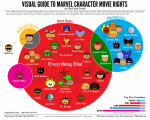trappedslider
Legend
Or in other words the Marvel Cinematic Universe.
A little history to bring folks update :
Back during the 90s and a bit before and bit after Marvel Entertainment sold off movie rights left and right to their Characters in order to stay a float. In 97, Marvel Studios was actively pursuing various film productions based on Marvel characters, including the eventual films X-Men (2000), Daredevil(2003) and Fantastic Four (2005).
The first movie from the licensing giving out was Blade in 98,after that the rights to spider-man and related characters were picked up by Sony. In 2000 X-men was made.
Skipping a head to 05, we see the return of the following rights to Marvel : Black Panther,Iron Man,Thor and Black Widow.
After being bought up by Disney, the following rights were reacquired : Blade,Daredevil and related characters,ghost rider,punisher.
Back In February both Sony and Marvel reached an agreement about the Spider-man rights which will let spidy appear in the MCU. However, Sony Pictures will continue to finance, distribute, own and have final creative control of the Spider-Man films. Marvel Studios will also explore opportunities to integrate other characters of the Marvel Cinematic Universe into future Spider-Man films.
So currently the only properties that Marvel/Disney do not have access to are : the X-Men and Fantastic Four franchise of characters at 20th Century Fox. And Namor, the reason behind Namor is due to older agreements that still need to be worked on before any movement can be done.
Now what the above means is that nowhere in the MCU are the words Mutant used to refer to abilities such as Quicksliver and The Scarlet Witch, they are instead branded as Miracle or Gifted. Also their parentage as being Magneto's children wont be referenced in Avengers 2.
And here's a handy chart that is up to date

A little history to bring folks update :
Back during the 90s and a bit before and bit after Marvel Entertainment sold off movie rights left and right to their Characters in order to stay a float. In 97, Marvel Studios was actively pursuing various film productions based on Marvel characters, including the eventual films X-Men (2000), Daredevil(2003) and Fantastic Four (2005).
The first movie from the licensing giving out was Blade in 98,after that the rights to spider-man and related characters were picked up by Sony. In 2000 X-men was made.
Skipping a head to 05, we see the return of the following rights to Marvel : Black Panther,Iron Man,Thor and Black Widow.
After being bought up by Disney, the following rights were reacquired : Blade,Daredevil and related characters,ghost rider,punisher.
Back In February both Sony and Marvel reached an agreement about the Spider-man rights which will let spidy appear in the MCU. However, Sony Pictures will continue to finance, distribute, own and have final creative control of the Spider-Man films. Marvel Studios will also explore opportunities to integrate other characters of the Marvel Cinematic Universe into future Spider-Man films.
So currently the only properties that Marvel/Disney do not have access to are : the X-Men and Fantastic Four franchise of characters at 20th Century Fox. And Namor, the reason behind Namor is due to older agreements that still need to be worked on before any movement can be done.
Now what the above means is that nowhere in the MCU are the words Mutant used to refer to abilities such as Quicksliver and The Scarlet Witch, they are instead branded as Miracle or Gifted. Also their parentage as being Magneto's children wont be referenced in Avengers 2.
And here's a handy chart that is up to date

